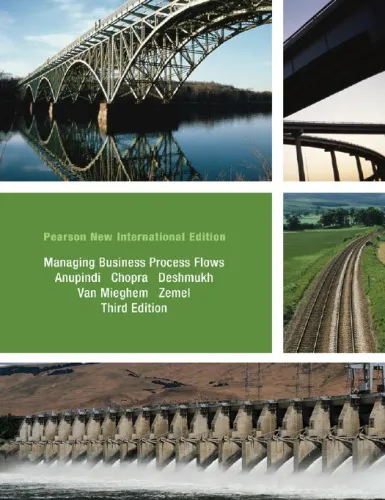Managing Business Process Flows: Principles of Operations Management
4.9
بر اساس نظر کاربران

شما میتونید سوالاتتون در باره کتاب رو از هوش مصنوعیش بعد از ورود بپرسید
هر دانلود یا پرسش از هوش مصنوعی 2 امتیاز لازم دارد، برای بدست آوردن امتیاز رایگان، به صفحه ی راهنمای امتیازات سر بزنید و یک سری کار ارزشمند انجام بدینکتاب های مرتبط:
معرفی کتاب "Managing Business Process Flows: Principles of Operations Management"
کتاب Managing Business Process Flows: Principles of Operations Management نوشتهی من، آنوپندی، راوی، یکی از منابع جامع برای مطالعه و مدیریت فرایندهای عملیاتی در سازمانهای مختلف است. این کتاب بهطور خاص برای دانشجویان، مدیران و متخصصانی طراحی شده است که میخواهند اصول پایهای Operations Management را درک کرده و در عمل پیادهسازی کنند. این اثر با ارائهی مدلهای ساده و کاربردی، روشهای علمی و ابزارهای تحلیلی، نقشهای دقیق برای بهینهسازی جریانهای تجاری ترسیم میکند.
خلاصهای جامع از کتاب
این کتاب با تأکید بر کارایی عملی و تحلیلی، به مدیریت جریانهای کسبوکار در سازمانها میپردازد و ترکیبی از مباحث آکادمیک و کاربردی Operations Management را عرضه میکند. این اثر دارای بخشهای مختلفی است که بعضی از آنها مفاهیم پایهای مانند ظرفیت، تقاضا، موجودی و کارایی را شامل میشود، و در کنار این مباحث، ابزارهای پیشرفته برای تحلیل و حل مسائل عملی نیز ارائه میشود.
در این کتاب، فرایندها بهعنوان واحدهای اساسی عملیات در نظر گرفته شدهاند. به مدیریت مؤثر جریانها پرداخته میشود تا حداکثر هماهنگی بین منابع و تقاضا برقرار شود و عملیات به بهترین حالت بهینهسازی شوند. از مدلهای تحلیلی برای فهم و بررسی جریانهای فرآیندی استفاده شده است تا کاربران سادهتر بتوانند چالشهای دنیای واقعی را مدیریت کنند.
نکات کلیدی (Key Takeaways)
- فهم بهتر از اصول و تکنیکهای بنیادین Operations Management.
- شناخت فرایندهای تجاری بهعنوان زیربنای تمام عملیات سازمان.
- کاربرد اصول علم Operations Research در مدیریت منابع و جریانها.
- آموزش ابزارهای تحلیلی برای بررسی ظرفیت، زمانبندی و موجودی.
- استفاده از مفاهیم ریاضیاتی و مدلهای شبیهسازی برای تصمیمگیری بهتر.
- توسعهی تفکر سیستمی در چارچوب فرایندهای کسبوکار.
نقلقولهای معروف از کتاب
"Operational productivity is not about working harder but ensuring every process flows effectively."
"Processes are the DNA of any organization, and managing them well defines success."
"Demand does not wait for capacity; operations must adapt continuously."
اهمیت این کتاب
این کتاب بهدلیل ساختار دقیق و عملیاتی خود، منبع ارزشمندی برای دانشجویان رشتههای MBA، مهندسی صنایع و افرادی که به مشاغل اجرایی یا مشاورهای علاقهمند هستند، محسوب میشود. در جهانی که هر روز به سمت پیچیدگی بیشتر حرکت میکند، توانایی مدیریت فرایندها و برنامهریزی منطقی، نقش بسیار مهمی در عملکرد رقابتی سازمانها دارد.
یکی از دلایلی که این کتاب در میان مخاطبان حرفهای و آکادمیک محبوب است، استفاده از مدلهای عملی و مثالهای واقعی بهمنظور آموزش مفاهیم نظری است. به کمک این کتاب میتوان فرایندهایی مانند کاهش زمانهای تلفشده، افزایش کارایی منابع و بهبود تجربه مشتری را بهشکلی نظاممند مدیریت کرد.
در نهایت، این کتاب فرصتی استثنایی برای یادگیری و رشد است که ذهن خوانندگان را باز کرده و آنها را قادر میسازد محصولات، خدمات و سیستمهای عملیاتی بهتری را طراحی و اجرا کنند. دانش ارائهشده در این اثر به شما کمک میکند تا در حرفه خود، تأثیر بیشتری بگذارید.
Introduction to 'Managing Business Process Flows: Principles of Operations Management'
‘Managing Business Process Flows: Principles of Operations Management’ is an insightful resource for understanding the underlying principles that govern modern operations management and process flows. Written by Ravi Anupindi along with co-authors Sunil Chopra and Sudhakar Deshmukh, this book has become a definitive guide for students, professionals, and practitioners who are keen to improve efficiency, productivity, and innovation in various organizational settings. Whether you're in manufacturing, services, logistics, or supply chain management, this book equips you with the essential tools to analyze and optimize business process flows effectively.
The book emphasizes a structured, process-oriented approach to understanding and addressing complex operational challenges. By providing robust theoretical models interspersed with real-world applications, it bridges the gap between abstract concepts and practical execution. With clear and systematic explanations, the book reinforces the importance of integrating operations management into the strategic framework of an organization to create sustainable competitive advantages.
Detailed Summary of the Book
At its heart, the book tackles the intricate relationship between process flows and operational excellence. It begins by defining the fundamental concepts of operations management and links them to an organization's broader strategic goals. The authors introduce key metrics and methodologies, such as capacity analysis, queuing theory, inventory models, and supply chain design, to unravel the core dynamics of operational processes.
Throughout its well-structured chapters, the book emphasizes data-driven decision-making and offers quantitative tools to analyze various process flow challenges. This analytical approach is supplemented with a range of case studies and examples, showcasing scenarios from both manufacturing and service industries. The interplay of supply, demand, and capacity is delved into in detail, helping readers to grasp the critical aspects of balancing these elements to enhance organizational performance.
Moreover, ‘Managing Business Process Flows’ covers advanced topics like variability in processes, risk pooling, sourcing decisions, and lean operations, ensuring readers are equipped with comprehensive knowledge. Each concept is supported with examples and exercises, making it an ideal textbook for students and a practical guide for professionals.
Key Takeaways
- Understand the core principles of operations management and their role in achieving business success.
- Gain expertise in analyzing and optimizing capacity, inventory, and process variability.
- Master key tools such as Little's Law, process analysis techniques, and inventory models for effective decision-making.
- Develop the ability to tackle real-world challenges across industries using a structured, process-oriented framework.
- Learn to align your organization's operational strategies with its business goals for sustainable growth.
Famous Quotes from the Book
"Managing business processes effectively means creating value out of every resource and activity while minimizing inefficiencies."
"Capacity, inventory, and time are the lifelines of any business process. Understanding their interplay is the foundation of operations management."
Why This Book Matters
Operations management is the cornerstone of an efficient and competitive organization. By focusing on flow analysis and process optimization, ‘Managing Business Process Flows’ provides a strong foundation for anyone keen on mastering the art and science of operations management.
Unlike many other books in this domain, this book stands out because of its clear and practical approach to analyzing complex systems. It merges theoretical clarity with actionable insights, making it a must-have resource for academics and business professionals alike. At a time when businesses are striving for efficiency, agility, and sustainability, this book equips readers with the frameworks and tools needed to rise to the occasion.
Whether you're tackling supply chain bottlenecks, optimizing resource allocation, or designing processes for a new product line, this book offers unparalleled guidance. It not only helps you understand "how" to manage business processes, but also "why" these processes are so crucial to your organization’s success.
دانلود رایگان مستقیم
شما میتونید سوالاتتون در باره کتاب رو از هوش مصنوعیش بعد از ورود بپرسید
دسترسی به کتابها از طریق پلتفرمهای قانونی و کتابخانههای عمومی نه تنها از حقوق نویسندگان و ناشران حمایت میکند، بلکه به پایداری فرهنگ کتابخوانی نیز کمک میرساند. پیش از دانلود، لحظهای به بررسی این گزینهها فکر کنید.
این کتاب رو در پلتفرم های دیگه ببینید
WorldCat به شما کمک میکنه تا کتاب ها رو در کتابخانه های سراسر دنیا پیدا کنید
امتیازها، نظرات تخصصی و صحبت ها درباره کتاب را در Goodreads ببینید
کتابهای کمیاب یا دست دوم را در AbeBooks پیدا کنید و بخرید






![The Ultimate iOS Interview Playbook: Conquer Swift, frameworks, design patterns, and app architecture [Team-IRA]](https://s3.refhub.ir/images/thumb/The_Ultimate_iOS_Interview_Playbook__Conquer__29925.webp)







